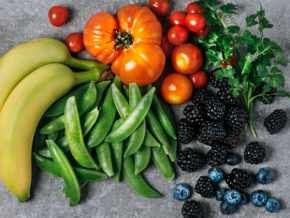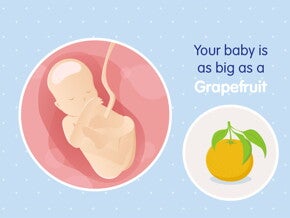
What are Carbohydrates good for?
Carbohydrates - along with fats - are the main sources of energy for you and your baby. When consumed in insufficient quantities, they might result in bouts of fatigue or food cravings during your pregnancy.
During the second and third trimesters of your pregnancy, your insulin requirements will be two to three times as high as under normal circumstances, as they are influenced by pregnancy hormones, which create a certain resistance. However, insulin plays an essential role: it allows the body to utilise carbohydrates, especially by transforming them into fat for storage, thus maintaining reasonable glycaemic levels. When the pancreas is unable to produce this surplus of insulin, this triggers diabetes, which only lasts for as long as the pregnancy. This is known as gestational diabetes or pregnancy-induced diabetes. A woman suffering from such diabetes will be placed on a specific diet.
On my plate …
There are two types of carbohydrates:
- sweet foods: sugar, honey, jam, chocolate, sweets, pastries, but also fruit, etc. They mainly contain simple sugars, which are rapidly absorbed by the body.
- starchy foods (pasta, rice, potatoes, etc.), cereals (wheat etc.) and dried legumes (lentils, red beans, chickpeas, etc.), which mostly provide complex sugars, which contribute to a feeling of fullness, as they are assimilated more slowly. Within this family, there is no distinction between the various foods.
Our practical suggestions
- Give preference to starches, legumes and cereals, all of which will provide you with long-term energy. Carbohydrates should represent most of the calories you consume. You should also think about your fibre intake by choosing whole-meal bread and cereals, to be consumed at various times of the day. Here are some examples to provide you with the energy you need:
- For breakfast : 80 g whole-grain bread or 60 g whole-grain cereals + 1 dairy product + 1 piece of fruit and 1 beverage.
- For lunch: raw vegetables + 1 portion of cooked vegetables + meat or fish + 1 dairy product + 1 piece of fruit + 50 g of whole-grain bread.
- Snack: a small cereal bar + 1 dairy product + 1 fruit and 1 beverage.
- For dinner: 1 portion of whole-meal pasta, accompanied by vegetables + 1 dairy product + 1 piece of fruit
- Your consumption of sugary foods should be moderate and only at the end of meals, as a matter of taste. You might also eat sugary foods when you are feeling faint or dizzy.
Divide your carbohydrate consumption over the entire day. Do not forget to have some in the morning to avoid fatigue, dizziness or hunger pangs during the late mornings.


















